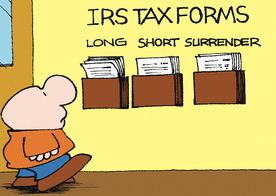- We are currently accepting new clients. I reserve the right to place new business clients on extension.
- All returns are held for review and are not filed “while you wait.”
- Prices depend on the length of the return (i.e., which forms and schedules are needed). All returns include free e-filing for federal and the first state return. Click here for more information about our charges. Click here to request a quote.
- First-year clients must call or e-mail for an organizer and, once that is completed, schedule an intake appointment. Our tax return intake procedure for new clients generally takes from 30 minutes to an hour. Intake appointments are free for first-year clients only. If you are an existing client and would like an appointment to review the information in your organizer with me we are happy to accommodate you but the consult fee will be a separate line item on your invoice.
- Existing clients may drop off tax documentation any time during regular business hours, mail it (USPS Priority Mail with Tracking is recommended), or upload it to our secure portal.
- To ensure the accuracy of the return we must make sure we have complete and accurate information. Collecting and organizing your information before you submit it and preparing any questions you may have about your tax situation in advance will help us to process your tax return more quickly.
- Saturday and evening appointments for review and signature will be available during February and March. We do not schedule client appointments on Wednesdays or Sundays!
In general, March and April are the worst time of year to be searching for a new #taxpro. At Tax Therapy, the needs of existing clients always come first and if I don’t feel that I can provide them the service they deserve, I will not accept new clients mid season, especially new business clients. That doesn’t mean I won’t do your taxes, it just means if you’re coming in during the height of season, please understand that I will definitely seem pressed for time—because I am pressed for time! Also, if I do accept your return, I may require you to go on extension, especially if you are business client. I want to make sure I have the time and focus to give your tax return the attention it deserves. I love talking to potential clients in summer and fall, so if you are simply “considering” making a change I encourage you to contact me between June and October when we will have plenty of time to talk.
This post provides an overview of how tax season “works” in the office. It is for new and existing clients.
Reminder Postcards
If you are a returning client or if I have “onboarded” you during the summer or fall, you will receive a reminder postcard in the mail sometime after January 10th. This lets you know that we are ready to send out our “organizer” paperwork. Many taxpros bulk mail their organizer to all of their clients all at the same time. We prefer to ensure that you are returning before we send you your preliminary paperwork. When you get the postcard, call or e-mail and we will send you an organizer via USPS or e-mail. Don’t worry if you are a new client and missed the postcard. Just call the office and Cat or I will take some preliminary contact information and get you an organizer.
Organizers
The organizer contains our engagement letter and privacy policy both of which must be signed before work begins on your return. Print and sign those documents.
The organizer also contains our client interview (which must be completed each year) and supplemental worksheets that apply to your specific situation (rental property, self-employed, etc.). The interview is designed to remind you of the documents you need to include with your return and to provide prompts about questions you may have had (but not asked) during the year. Review and complete the client interview and any additional worksheets. Be sure to review/update ID and banking information, healthcare coverage information, and foreign accounts/interests, information. Collect your other tax documents (W2s, 1099s, etc.) and return your organizer and your documents to the office.
Returning Your Organizer
 Returning clients—You can mail (or courier), upload, or bring your documents to the office. Please do not e-mail your documents; it is not secure. Also, if you happen to have my cell number please do not text me pictures of your documents.
Returning clients—You can mail (or courier), upload, or bring your documents to the office. Please do not e-mail your documents; it is not secure. Also, if you happen to have my cell number please do not text me pictures of your documents.
New clients—Once you have everything together, please call or e-mail Cat to schedule an intake appointment. Bring your completed package to your intake appointment along with your photo ID and Social Security card (and your spouse’s if filing jointly). Bring birth certificates and Social Security cards for anyone you are claiming as a dependent on your return. If I do not already have them, please bring at least one and up to three prior years’ tax returns. If you think your IDs and dependent IDs have already been verified (for example at an appointment this summer), let Cat know. If we have already verified your ID, your intake appointment is optional. If you live “far far away” I can verify your ID and do your intake appointment using Skype and you can use the secure portal or US Mail (or another carrier) to provide your documents. Remind Cat that you need a Skype appointment rather than an in office appointment. She will let me know and I will be in touch with more details.
What Happens Next
I do not do returns “while you wait.” If you want to know why, you can read more about that here. Once you have submitted your information, it goes into our “queue.” In general, returns are processed first in, first out. Cat scans documents, does the data entry, and notes any items that may be missing. I review the data entry, review any questions noted in your organizer, review the entire tax return and compare it to last year’s return, and prepare a list of follow up questions and missing items. I will either call or e-mail you to get any additional information I need to finish your return. Usually I e-mail because then my questions and your answers are easily saved into your work file. While I’m waiting for your response, I move on to the next return in the queue. Responding to my questions quickly, thoroughly, and accurately will ensure that your return is done as quickly as possible. Sometimes I block out an entire day simply to “close out” returns with missing information.
When your return is finished and depending on your situation and location—1) Cat will call you to schedule a review & signature appointment, 2) I will upload a review copy of your return to the secure portal, or 3) I will use USPS Priority Mail with tracking to send you your return and signature documents. If you prefer a courier other than USPS (FedEx or UPS, for example) we are happy to comply but we will bill you for the difference in price. If we are working remote, once you have had an opportunity to look at your return you may call (505-352-0058) or e-mail for an appointment to discuss the results before you sign.
Reviewing and Signing Your Return
Paying for Your Return
Other Important Information
The answer to the “What do you charge” question is available here, but as with most things tax-related, the answer is “it depends.” I encourage you to request a quote for the most accurate answer. That said, we try to keep our prices in line with national averages and a certain amount of “during the year” Q&A is included in our return preparation fee. I will always let you know when you are straying into billable territory and you can choose whether or not to proceed.
New clients coming in during tax season are required to pay the base price of their return (1040 or entity) when they submit their organizer paperwork. I don’t like having to do this, but last year too many clients came on board during tax season, had me do their returns, decided they either didn’t like my follow up questions or didn’t like the results, and then did not want to pay for the work. Requiring base price of the return ensures that I get paid at the minimum level for work done on a tax return. We will not accept your paperwork until payment is made.
I use Constant Contact e-mail to keep clients informed during tax season. I provide updates about the steps in the process frequently. For example, I send an e-mail when the postcards “drop”; then another one about what to do with your organizer when you get it and the most common errors clients make when completing their organizers. I sometimes send an e-mail if I find many clients are calling with the same question or problem or if I am seeing the same error over and over in returned tax packets. I always send e-mails if there are issues in the office that interfere with our work (power outages, internet outages, illness, staff emergencies, etc.). I also always send e-mails when I feel like I am running behind in processing returns. I will let you know how far “back in the drawer” I am. I sometimes get behind on individual returns around the deadline for entity (partnership & S-corp) returns. If that happens I send out an e-mail letting you know, for example, that I am currently two weeks behind—meaning if you submitted your packet two weeks ago, I’m just getting to it now.
Our goal is to provide a reasonably personalized experience while still keeping our prices within reach of the average taxpayer. Yes, we do cost more than a DIY option. I discuss the reasons for that in this post. No, we cannot tailor our office processes to match your previous preparer’s or your individual expectations. I try to be as flexible as possible, nevertheless, my office processes are designed to ensure that our work flows smoothly, we don’t miss important details or deadlines, and that, in general, the office runs efficiently for staff and clients.
 Tax Therapy provides services to individuals and to small and micro businesses. We do not provide bookkeeping services but we can help you find a bookkeeper. At this time we do not file FBAR returns or do other FACTA compliance for those with financial interests outside the U.S. We are happy to provide referrals to colleagues who specialize in international taxation.
Tax Therapy provides services to individuals and to small and micro businesses. We do not provide bookkeeping services but we can help you find a bookkeeper. At this time we do not file FBAR returns or do other FACTA compliance for those with financial interests outside the U.S. We are happy to provide referrals to colleagues who specialize in international taxation.
While I will take new business clients during tax season, I will typically ask or even require you to go on extension. In general, if you are a business looking to retain a tax professional for the first time or to change tax professionals it is best to contact us (or almost any tax professional) between June and November. That way we have time to review your returns and your situation outside the chaos that is tax season!
Forms and returns we can file for you and your company:
This is only a partial list, we can file forms necessary to prepare individual returns and most small business returns.
- 1040
- Schedule A (itemized deductions)
- Schedule C (profit/loss from business)
- Schedule D (capital gains/loss)
- Schedule E (rental income/loss)
- Schedule F (farm income/loss)
- 1065 (partnership returns)
- 1120 (corporate returns for C corps, S corps, Homeowners Associations, and Political Campaigns)
What we need to have to prepare your tax return:
This is only a partial list —please bring any additional documentation you feel may be necessary to prepare your return.
- Photo ID for you and your spouse if we have not already verified your identity. ID verification can be done via Skype for remote clients.
- Names, birth dates, and Social Security numbers (or tax ID numbers) for yourself, your spouse, and all of your dependents.
- W-2s and 1099s from your employers.
- 1099s from your bank and brokerage accounts.
- If you are a new client please bring at least one and up to three prior year’s tax returns.
- If you are a business please bring your organizing documents, and NM-CRS returns, payroll tax returns, and (if possible) a current P&L and balance sheet.
 Please do not bring piles, bags, or boxes of receipts unless we ask you to! We do not have space to store them. Scanning, sorting, or otherwise manipulating receipts and other data used to prepare your return is not included with the price of tax return preparation. You will be charged by the hour (half hour minimum) in quarter-hour increments for any administrative time necessary to prepare information for your return.
Please do not bring piles, bags, or boxes of receipts unless we ask you to! We do not have space to store them. Scanning, sorting, or otherwise manipulating receipts and other data used to prepare your return is not included with the price of tax return preparation. You will be charged by the hour (half hour minimum) in quarter-hour increments for any administrative time necessary to prepare information for your return.
The government shutdown is over until February 15th. That means that IRS workers will be able to return to work and get paid for it. Of course, already understaffed and overworked, they are now facing a huge backlog of returns when e-filing season officially opens on Monday. The CAF unit (that processes our representative power of attorney authorization documents) is also probably going to get swamped. So please, be patient and kind. The IRS is responsible for implementing the laws. They don’t make them and they sure as heck didn’t make this shutdown mess.
 Absolutely. Married filing joint or separate returns can and will be filed for any couples who are legally married (same or different sex). Tax Therapy does not discriminate on the basis of anything: race, religion, sexual orientation, gender, income level, political affiliation. Nothing. The only returns we refuse to file are those for people who refuse to provide complete and accurate information and/or payment. If you are abusive to the administrative staff we may also refuse to do your return. Otherwise, we welcome your business and are happily accepting new clients.
Absolutely. Married filing joint or separate returns can and will be filed for any couples who are legally married (same or different sex). Tax Therapy does not discriminate on the basis of anything: race, religion, sexual orientation, gender, income level, political affiliation. Nothing. The only returns we refuse to file are those for people who refuse to provide complete and accurate information and/or payment. If you are abusive to the administrative staff we may also refuse to do your return. Otherwise, we welcome your business and are happily accepting new clients.
I recently “boosted” a post on the Tax Therapy FaceBook Page. This was the first time I ever did that (I have since boosted one more and I’m going to boost this one). Facebook algorithms being what they are, after I boosted the post I started seeing other posts from my colleagues that said exactly the same thing. Why? Because they were all written by the same author! Each of my colleagues gave credit to the original author of the post—Julie Dailey, EA of Julie’s Tax Service. I, unfortunately, did not. I did credit an author because if I am using someone else’s work, I want them to get the credit for it. But I did not credit the correct author. After seeing so many other posts that gave credit to Julie, I began wondering why mine had another name on it. I remembered seeing it last tax season, thinking it was great, and copying it into my “ideas” file with the author’s name. But I also started thinking that I had read many of Julie’s excellent posts during tax season last year and this year and that the piece I shared certainly did sound like her “authorial voice.” (I was a writer/editor in Career 1.0, so I know these things.) Concerned, I messaged Julie, who I know from several professional groups on Facebook, and asked her! I told her that I thought I had mis-attributed a piece of her writing to another author. She confirmed that she had written the piece over two years ago. She also told me that she had repeatedly asked the professional to whom I gave credit to attach her name, not his own, to her writing. Julie has no problem with other #taxpros using her writing (which is excellent) as long as she is credited for the work. And she should be credited—it’s good writing. And and good writing, like good tax return preparation, looks easy when you’re just looking at the end result and not at all the work that goes into getting it right. Needless to say, I was both mortified at the error and furious that some other Enrolled Agent so casually put his name on Julie’s work.
But what about that other #taxpro. The one who put his name on Julie’s work? Plagiarism is a form of theft. Do you really want to hand your financial identity and the responsibility for preparing an accurate tax return over to someone who is, in effect, a casual thief? I sure hope not. I’m posting this first (as always) to urge you to “choose wisely, choose well” when choosing someone to prepare your tax returns, but also to ensure you that I am committed to maintaining my professional integrity, which includes admitting when I have made an error and doing everything in my power to correct that error once made. I have apologized to Julie, I have edited the incorrect ad/post, and I’m paying to boost this post for double the amount of time of that first post in the hopes that it reaches whoever may have seen the original, incorrectly attributed post so that they can be made aware of the true author of that piece of work.
No one would have known (except me and Julie) if I had not chosen to broadcast my error but, as Aldo Leopold said “Ethical behaviour is doing the right thing when no one else is watching—even when doing the wrong thing is legal.” Tax Therapy is committed to maintaining the highest ethical standards. Julie, if you’re reading, I know you don’t think this mess is my fault, but I do hope you will accept again my sincerest apologies for the foul up.
Amber
 You know, in general (in marketing terms) I get a pretty good “open” response on the e-mails I send to clients. But that response is often 50-60% which means that many of you aren’t opening or reading my e-mails (and maybe aren’t reading this blog either). In any case, every summer I offer clients a free “withholding checkup” via e-mail to ensure that they are withholding enough to cover their potential tax bills come April 15th. Usually only a handful take me up on this offer.
You know, in general (in marketing terms) I get a pretty good “open” response on the e-mails I send to clients. But that response is often 50-60% which means that many of you aren’t opening or reading my e-mails (and maybe aren’t reading this blog either). In any case, every summer I offer clients a free “withholding checkup” via e-mail to ensure that they are withholding enough to cover their potential tax bills come April 15th. Usually only a handful take me up on this offer.
The passage of the Tax Cuts & Jobs Act (TCJA) late in 2017 resulted in a tax cut for many taxpayers. This tax cut caused the withholding tables to be adjusted in February 2018. So most wage earners were seeing more money in their paychecks because less was being withheld for federal income tax. In Summer 2018, the IRS realized that many taxpayers were going to be under withheld and they started a huge information campaign encouraging taxpayers to check their withholding using a withholding calculator that they developed. Unfortunately, as is common with “things IRS”, the cure is worse than the disease. You practically had to do your 2018 tax return to figure out if your withholding is on target. So, if you couldn’t figure out the IRS tool, and you didn’t ask your #taxpro for help, then you may be under withheld and you may have a much smaller refund, a balance due, or a much bigger balance due than you are expecting when you file your 2018 taxes.
The IRS finally realized that most taxpayers don’t pay attention to their taxes except during tax season and has decided to waive the penalty for underpayment of taxes…but of course there is fine print. Typically you are assessed a penalty if you don’t pay in at least 90% of the tax due (this figure is higher for higher income individuals). They have reduced that to 85% for this year. That is good news for all of the taxpayers who “missed the memo” and who end up underpaying their 2018 tax because of the new laws and the new withholding tables. Of course it doesn’t help you pay that balance due that you weren’t expecting or the bills that you were going to pay with your now much smaller refund.
Helping clients “dial in” their withholding and estimated tax payments is part of what I do when I prepare a tax return. It’s included with return preparation as is a mid-year withholding check up. If you’re wondering why you should pay a #taxpro to do your taxes, this is just one of many reasons. We think about this stuff year round so you don’t have to! And we help you avoid “nasty surprises.”
A popular brand of DIY software is fond of telling you “It doesn’t take a genius to do your taxes.” At least that’s what they were telling you last year. This year they are telling you about all the “CPAs” they have on staff to help answer your questions. They have enrolled agents too. Don’t know the difference or never heard of an enrolled agent? Click here for more information on the different types of #taxpros.
So if it doesn’t take a genius to do your taxes, why in the world do they need all that extra staff to answer your questions? Because preparing a tax return is not as easy as it looks. Even experienced professionals have questions (and make errors) in things as seemingly straightforward as filing status or who qualifies as a dependent. Answer to the latter? It depends on what “the dependent” is being qualified for—different tax benefits (credits) have different requirements! Add a small business or even a rental property to your tax return and the complexity just went up by an order of magnitude. Heck, I know geniuses (card-holding Mensa geniuses) who prefer to hire a #taxpro than to do it themselves because while they are super smart in general and really super smart in their fields, they are also smart enough to recognize when they don’t want to deal with something that isn’t necessarily complex (read the rules and apply them) but can be dizzyingly complicated (lots of interlocking moving parts and even more “ifs and buts”).
Still, when it comes to tax returns you have plenty of options but they come in two flavors—
Do It Yourself With Software: Whether you choose a package like TurboTax or file online for free through the IRS website, this option will work for you if you have a basic understanding of what needs to be done and if your tax situation is relatively uncomplicated. When I say “relatively uncomplicated” I mean that you are a W2 employee with a minimal number (or no) itemized deductions and only basic banking and investment accounts. Of course, the requirements of the Affordable Care Act (a.k.a. Obamacare) add a level of complexity for anyone who doesn’t have Medicare or employer-provided coverage for everyone in the household. If you changed jobs, had a gap in coverage, or received the Premium Tax Credit, you still may want to consult a tax professional even if the rest of your return is fairly simple.
Pay a Professional: If you own your own business, have a rental property, have brokerage accounts that are not retirement accounts, are eligible for the Earned Income Tax Credit, have higher education expenses, have income in more than one state, or any number of other “complicating factors” it may be in your best interests to consult a #taxpro. I know that the tax software companies want you to believe you can have a rental property or own your own business and still do your taxes yourself, and maybe you can, but the consequences of failure are relatively high so maybe you don’t want to.
Before you make your decision you also need to consider your own threshold for pain. DIY involves re-familiarizing yourself with something that is largely alien to you once each year (whereas I and many #taxpros pretty much eat, breathe, and sleep tax law year round). I have clients who did their own tax returns for years before coming to me. What changed their mind? They decided they had better things to do than read form instructions, answer software interview questions in a language in which they are not fluent (internal revenue code), and in general try to figure out if they were doing everything right.
And what if you didn’t do everything right and get a notice? I have some friends who became clients after making a couple of minor errors on a return that resulted in an IRS notice. I was able to review the notice and quickly find one of the two errors and when they went to the IRS to sort it out, the IRS pointed out the other one (it was an age issue my software would have caught easily had they been customers). My ability to easily see what a big part of the problem was sold them on deciding to hire a #taxpro moving forward. When they came to their first review & signature appointment I had them sign their e-file authorizations and they said “What do we do now?” and I answered “Go have a beer?” They have really learned to enjoy not having to spend hours every year preparing their own return.
These same clients also learned that I am here year round if they get a notice or have a question. I’m really not sure how DIY box software handles “after the return is filed” issues. I’m pretty sure they don’t make themselves available to answer questions year round if you decide to say, sell your rental house. Even if you are hiring a professional you want to make sure your #taxpro is both willing and available to help. Many big franchises are closed off season and many part-time solo practitioners go back to their “regular” jobs after filing season and don’t want to help (or aren’t available even if they do want to help).
Yes. Hiring a professional costs more than doing it yourself. But there are both risks and opportunity costs to doing it yourself. Sometimes the cheapest option is not the best option. I’ll discuss more on costs in a future post.
Still not sure? Read what the IRS has to say here.
 My post on choosing a #taxpro mentions that price should be a concern, but not the only concern. Still, I recognize that people want to have at least some idea of what they will be charged for return preparation. The problem is that it is extremely difficult to estimate charges without at least seeing last year’s return. My fees are based on a set price for a Form 1040 and then an additional fee for each additional form or schedule required. If I don’t know the forms and schedules you will need, it is hard to give an accurate estimate. Even if I have last year’s return to make a more accurate estimate, changes in your tax situation or in, for example, IRS due diligence requirements for certain tax credits means that you may need to file forms that weren’t necessary last year. Occasionally your tax situation changes in your favor and forms that were required the previous year (maybe you were able to itemize deductions or maybe you had some capital gains or losses) aren’t required this year.
My post on choosing a #taxpro mentions that price should be a concern, but not the only concern. Still, I recognize that people want to have at least some idea of what they will be charged for return preparation. The problem is that it is extremely difficult to estimate charges without at least seeing last year’s return. My fees are based on a set price for a Form 1040 and then an additional fee for each additional form or schedule required. If I don’t know the forms and schedules you will need, it is hard to give an accurate estimate. Even if I have last year’s return to make a more accurate estimate, changes in your tax situation or in, for example, IRS due diligence requirements for certain tax credits means that you may need to file forms that weren’t necessary last year. Occasionally your tax situation changes in your favor and forms that were required the previous year (maybe you were able to itemize deductions or maybe you had some capital gains or losses) aren’t required this year.
Preparing an accurate return and working to ensure that you are in tax compliance (that is actively working to prevent ‘nasty surprises’) sometimes means that estimates (no matter how carefully they are created) don’t always conform to the reality of a given situation. The longer you work with your chosen #taxpro the easier it is to get an accurate estimate. I encourage my clients to call during the year with questions. A certain amount of basic Q&A is built into the cost of your tax return preparation fee and if your questions get more complicated, I will always warn you that you are straying into “billable hours” territory before we proceed. Usually if we stray into that territory I will ask you to make an appointment to come in for a consultation that is billed at an hourly rate.
If you landed here simply wondering how much Tax Therapy charges for return preparation, please download and complete a Quote Request and return it to us via snail mail, e-mail, or fax (505-352-0362). Please do not include your SSN or any other sensitive information on the request. I can assure you that we work hard to keep our prices near national averages and that we are committed to providing value for your return preparation dollar.
Remember, the lowest bidder is not always your best option. When choosing a #taxpro, choose wisely, choose well.
I’m no fool. I know three things usually come to mind when people start to think about doing their taxes: TurboTax, CPAs, and that big franchise that does all the advertising. All of those are perfectly viable solutions, but there are other options. You should choose the option that best meets your needs.
Do It Yourself With Software: Whether you choose a package like TurboTax or file online for free through the IRS website, this option will work for many people who have a basic understanding of what needs to be done and whose tax situation is relatively uncomplicated. When I say “relatively uncomplicated” I mean that you are a W2 employee with a minimal number (or no) itemized deductions and only basic banking and investment accounts. Of course many tax credits, especially the Earned Income Credit and those related to education expenses add complexity to returns as does buying healthcare insurance through the marketplace. If you claim child or education related credits, are filing head of household, or bought marketplace health insurance you still may want to consult a tax professional even if the rest of your return is fairly simple. Tax Court was held in Albuquerque last week and over half of the cases related to these types of issues many of which could have been avoided with proper return preparation.
Pay a Professional: If you own your own business, have a rental property, have brokerage accounts that are not retirement accounts, are eligible for the Earned Income Tax Credit, have higher education expenses, have income in more than one state, or any number of other “complicating factors” it may be in your best interests to consult a tax professional. I know that the tax software companies want you to believe you can have a rental property or own your own business and still do your taxes yourself, and maybe you can, but the consequences of failure are relatively high so maybe you don’t want to. If you decide you don’t want to it’s important to realize you have more options than a CPA or a Tax Attorney. You can choose an Enrolled Agent or what is known as an “unenrolled preparer.” What follows is a brief description of each type of professional and what they can and cannot do for you.
CPA (Certified Public Accountant)
CPAs are licensed by a state licensing authority (and many states recognize other states’ licenses). CPAs are authorized by the IRS to represent taxpayers before the IRS (including collections and appeals) in the event of an examination (an audit). They cannot represent taxpayers if the tax matter is elevated to Federal District Court or Tax Court, for that you will need an attorney. It is important to note, however, that not all CPAs are experienced in tax preparation. CPAs are, by definition, accountants. Many specialize in financial accounting and auditing, but have little to no knowledge of tax accounting and/or tax return preparation. That’s OK, but it is important to ask, if you are considering hiring a CPA to prepare your tax return, how much tax return preparation experience s/he has. It’s also important to ask if s/he specializes in individual or business tax returns or has other specialized experience that you may need. Tax returns for truck drivers, clergy, pilots and flight attendants, and expatriates and other international clients have unique requirements and not all tax professionals have experience in those areas.
Pros: CPAs are licensed and can represent you before the IRS (whether they prepared your return or not).
Cons: Can be expensive and might be “overkill” for some taxpayers. Not necessarily experienced in tax return preparation so check to make sure.
Tax Attorney
Like CPAs, attorneys are licensed to practice by their state bar and, again, many states recognize other states’ licenses. Tax attorneys are also authorized by the IRS to represent taxpayers in examinations and before collections, and in appeals. They are also authorized to represent taxpayers in Federal District Court and Tax Court. Again, however, not all tax attorneys have experience actually preparing income tax returns. If you need representation in an audit or before the IRS or a court in a tax matter an attorney is a great option. For preparing returns an attorney may not be your best option unless your tax situation is highly complex and you need someone with a thorough background in tax law. It is important to keep in mind that while all attorneys can represent you in tax matters, not all attorneys specialize in tax matters. If you have a tax matter for which you are hiring an attorney it is in your best interest to get one who specializes. The tax code is too big and too complicated for most general practitioners.
Pros: Attorneys are licensed and can represent you before both the IRS and in Tax Court and Federal District Court (whether they prepared your return or not).
Cons: Same as with CPAs, they can be expensive, might be overkill for basic return preparation, and may be more experienced in representation than with actual return preparation matters.
USTCP (United States Tax Court Practitioner)
I took the test to obtain this credential early last month. The exam is extremely difficult, is only offered in Washington D.C. every other year, and has a pass rate of less than 20%. I will find out if I passed sometime in April and if I did then I have to complete my application to practice (including getting letters from two practitioner sponsors). Pass or fail, I know much more about your representation rights than I did when I started studying.
Update September 2019: I passed. The pass rate was, once again, under 20%. 143 people sat for the exam; 22 passed. I can now represent you beyond IRS Appeals and into Tax Court. A proper attorney, licensed by a state bar, will be required if appealing the Tax Court decision is necessary.
USTCPs are basically tax attorneys in all but name. They are not licensed by a state bar, but they are authorized to represent taxpayers before the IRS and in Tax Court (but not Federal District Court or U.S. Appeals Courts). The interesting thing about many USTCPs is that they often start as paid tax return preparers and decide to add advanced taxpayer representation to their services offered.
Pros: Can represent you even if they didn’t prepare your return at all levels of the IRS and in U.S. Tax Court. Specialize in representation involving tax matters so they are tax law experts. Often experienced in tax return preparation.
Cons: Might be expensive. Hard to find (there aren’t many of them).
EA (Enrolled Agent) – That’s Me.
“An enrolled agent is a person who has earned the privilege of representing taxpayers before the Internal Revenue Service. Enrolled agents, like attorneys and certified public accountants (CPAs), are generally unrestricted as to which taxpayers they can represent, what types of tax matters they can handle, and before which IRS offices they can represent clients.”
Additionally, many EAs had experience preparing tax returns before deciding to obtain the EA credential and many offer both return preparation and representation services. Note that some EAs may specialize in one area or the other, but they are usually competent at both.
Pros: Many offer different price structures for return preparation and representation. Can represent you before all levels of the IRS. Credential and continuing education focus exclusively on tax matters and ethics. Credential covers all aspects of federal taxation: individual, business, return preparation, representation, professional ethics.
Cons: Cannot represent you in Tax Court or Federal District Court. You’ll need a USTCP or an attorney for that.
Annual Filing Season Program Record of Completion
This program is open to unenrolled (non-EA, CPA, Attorney) PTIN holders. It offers limited representation rights to tax practitioners who fulfill the requirements. AFSP participants receive a record of completion that allows them to represent clients before IRS customer service staff (not collections or appeals officers) and only for taxpayers whose returns they have prepared. AFSP participants are required to pass a 100-question basic knowledge test each year, obtain a minimum number of continuing education credits during the previous year, and agree to abide by Treasury Circular 230 (whose requirements govern enrolled preparers). It’s the most basic credential one can obtain as a paid tax return preparer. That said, it does provide a limited amount of evidence that a CPA or an Attorney has some experience in tax matters. Many EAs, and some CPAs and attorneys, choose to hold this designation in addition to the higher credentials simply because of how the IRS promotes the program.
Pros: The record of completion is fairly easy to obtain and hold so it may be easier to find a practitioner who holds it. Because of the lower requirements it is also less expensive to hold and this may be reflected in the price of your return. Demonstrates a certain level of seriousness or commitment to the return preparation profession.
Cons: Representation rights are extremely limited. In the absence of any other credentials, it’s the absolute minimum level of credentialing for a competent tax preparer in my opinion.
Unenrolled Preparer (PTIN Holder)
While those who have obtained the AFSP record of completion are also considered unenrolled preparers they do have limited rights to represent you if they prepared your return. Unenrolled preparers who have only a PTIN are not even allowed to write a letter for you even if they prepared your return. Some of them may do it, but they are acting outside the scope of their authority.
Pros: Probably widely available. Probably lower prices. No continuing education or ethics requirements. Little (if any) accountability.
Cons: May not be available outside of tax season. No representation rights. If you have a problem you will have to hire another professional to represent you.
Many tax practices (both independent and the franchises) have more than one type of credentialed tax preparer in the office. You should always choose a tax professional based on your needs, but sometimes it’s OK to choose a less-credentialed preparer if they have access to a more experienced and/or more credentialed person in the office (and you feel confident that they can recognize when they need help and that they will get it when they need it). Deciding on price alone is rarely the best option. Remember, your tax professional often maintains your entire identity (both financial and personal) in their files. Take your time to find the right practitioner and to build a lasting relationship with him/her. You won’t regret it.
Still not sure? Read what the IRS has to say here.



